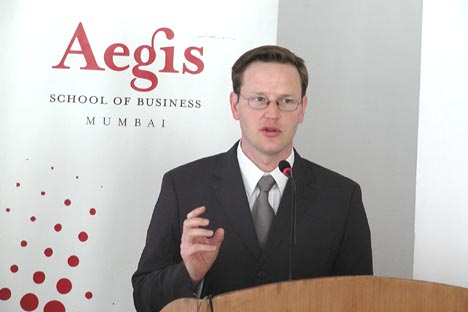|
Home
Got the full-time/part-time MBA blues?

"Got the full-time/part-time MBA blues?" a article by Thor Hendrickson, Founder Dean, Aegis, published in Learning Curve in Economics Times
Thor is BS from MIT and an MBA from London Buiness School
Source: Economic Times
In theory, sports cars are extremely fast. In practice, traffic and rough roads slow them down so much that you are usually better off taking an auto rickshaw. In theory, part-time business education programmes are better in almost all respects than their full-time counterparts. In practice, the choice is more difficult.
The obvious advantage to part-time programmes is that a student can continue to work. This ensures a continuous salary and reduces placement concerns. More importantly, at least to those of us on the teaching side, students get the chance to apply and examine concepts from the classroom every day at work.
Another advantage to part-time programmes is that corporations often sponsor candidates for part-time programmes. Sponsorship is currently rare for full-time programmes. Most companies view sending employees to generalised training, such as a part-time MBA, purely as a perk. Companies do not expect anything more from an employee than for the employee to appreciate the benefit and to show up to work during the time of the programme. This attitude takes pressure off the student yet it also means that a company may not be overly concerned with programme quality. Thus, you should look at company-sponsored programmes carefully.
The obvious advantage of a full-time programme is that there is more time to learn. The typical format of part-time programmes can be, unfortunately, too demanding for many students. Part-time course are usually taught every Sunday or several nights a week. Students need time to recharge, time to spend with their families, time to rest. Working every Sunday for two years does not allow much free time. For those employees on a six-day work schedule, there is no free time at all.
Professors constantly complain about students showing up unprepared for class and literally sleeping through lectures. Sleeping through lectures is often markedly worse for BPO workers as they already have to deal with high levels of sleep deprivation.
“So what?” you may assert. “Nothing comes free. It takes a great amount of effort to get an MBA and keeping a full-time job in addition is always going to be tough.” Even assuming that you are tough enough to handle the workload, it is likely that your classmates will not. Learning, especially in a business school using case studies, has more to do with learning from your peers than from your lecturer. If the rest of your class is unprepared then you will lose out.
You should look for part-time programmes with truly dedicated students having significant work experience. A thoughtful and knowledgeable fellow student, bringing fresh experiences into the classroom, even if a little sleep deprived, can outweigh many of the drawbacks. Since most full-time programmes in India focus on inexperienced freshers, the quality of classroom discussions in part-time courses is generally better than in even the most prestigious full-time programmes. One notable exception is company-sponsored programmes for junior employees where a class of 60 students can see the same year of experience 60 times over.
Like students, professors do not readily give up their weekends or evenings. Given the chance, professors will get out of teaching part-time courses. All too often, this means that students end up with junior lecturers. Some junior lecturers are world class. After all, even the big names had to start somewhere. However, most junior lecturers are last year’s unemployable graduates from the full-time programme.
There are three ways a degree can help in your future: knowledge, networking and prestige. We have looked at knowledge so let us now look at networking and prestige.
Due to time constraints, networking in a part-time programme may be minimal as a strong community spirit may fail to develop. Another concern is that the full-time MBAs may not recognise part-time students as part of “their” network. If you attending a part-time programme in the hopes that you will tap into the full-time alumni network, then you must first find out about full-time alumni attitudes.
In terms of networking, your direct classmates are your greatest assets. You know them personally and it is in everyone’s self-interest for your class to succeed. In full-time programmes we often see students forming lifetime bonds. Part-time programmes tend not to form as strong of a bond yet the quality of the network in part-time programmes tends to be superior in the short-term. In a part-time programme, |


